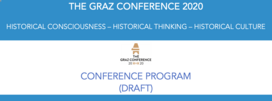III – ‘Historical Culture’ in intercultural perspective
As an umbrella concept, ‘Historical Culture’ has been broadly described as ‘people’s relationship to the past’. Originating from German history didactics of the 1970ies with its prior focus on the construction and de-construction of historical knowledge in the history classroom, the research concepts of ‘historical culture’ (Geschichtskultur) then adopted a social constructivist approach and widened the scope of interest to all forms of social practice which contributed to the construction of ‘historical consciousness’, such as museums, exhibitions, film, TV, internet and/or the historically inclined cultural industries, including in recent time also computer games. A second strand in the research concept on ‘Historical Culture’ reacted to the ‘cultural turn’ in the humanities in the 1990ies and focused on ‘discourse’, ‘representation’ and ‘performativity’ to be considered as constitutive elements of social organization.
Clarification and debate might also be useful in relation to concepts of individual and collective memory as well as to the multiple forms of (popular) ‘memory culture’, monuments, places of memory, imaginative constructs of collective identity in their interrelation to the core concepts of history didactics.
Questions of interest:
- Who are the actors /agents of historical culture?
- How do we conceptualize the relationship between the various agents/producers of historical consciousness [historians, teachers, teacher trainers, public historians, filmmakers, etc.], the various institutions and media [schools, corporate culture, universities, museums, archives etc.] through which their elements/narratives are circulated, and the “consumers” [students, “the public,” citizens, etc.] in and for intercultural, democratic societies?
- What forms of historical culture [forms through which historical consciousness is expressed], should be discerned for the discourse on history didactics in the digital age: e.g. (textual, oral and graphic) narratives, historiography, staging and installations in museum exhibitions, performances and orchestrations via internet and social media, …?
- Is there an interrelation/discourse between concepts of memory cultures (Individual – collective memory) and the core concepts of ‘historical consciousness’ and ‘historical culture’?
- Is there an impact of (a theory of) immersion on the concept of historical culture?
Conference Office
Alois Ecker
Institute of History
Heinrichstraße 26/II
8010 Graz
Institute of History
Heinrichstraße 26/II
8010 Graz
Benjamin Ecker
Institute of History
Heinrichstraße 26/II
8010 Graz
CONFERENCE OFFICE
grazconference2020(at)uni-graz.at
+43 699 19221739
Bettina Paireder
Alois Ecker
Benjamin Ecker



